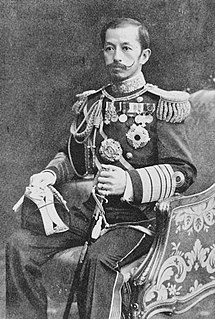 W
WPrince Arisugawa Takehito was the 10th head of a cadet branch of the Japanese imperial family and a career officer in the Imperial Japanese Navy.
 W
WMarshal Admiral Prince Fushimi Hiroyasu was a scion of the Japanese imperial family and was a career naval officer who served as chief of staff of the Imperial Japanese Navy from 1932 to 1941.
 W
WMarshal-Admiral Prince Higashifushimi Yorihito was the second head of the Higashifushimi-no-miya, an ōke cadet branch of the Japanese imperial family.
 W
WMarshal Admiral Baron Ijūin Gorō was a Meiji-period career officer in the Imperial Japanese Navy.
 W
WMarshal Admiral Viscount Inoue Yoshika was a career naval officer and admiral in the Imperial Japanese Navy during Meiji-period Japan.
 W
WMarshal-Admiral Count Itō Sukeyuki was a Japanese career officer and admiral in the Imperial Japanese Navy in Meiji-period Japan.
 W
WMarshal-Admiral Viscount Katō Tomosaburō was a career officer in the Imperial Japanese Navy, cabinet minister, and Prime Minister of Japan from 1922 to 1923.
 W
WMineichi Koga was a Japanese Marshal Admiral and commander-in-chief of the Imperial Japanese Navy's Combined Fleet.
 W
WOsami Nagano was a Marshal Admiral of the Japanese navy and one of the leaders of Japan's military during most of the Second World War. In April 1941, he became Chief of the Imperial Japanese Navy General Staff. In this capacity, he served as the navy's commander-in-chief in the Asia-Pacific theater until his removal in February 1944. After the war, he was arrested by the International Military Tribunal for the Far East but died of natural causes in prison during the trial.
 W
WMarshal-Admiral Marquis Saigō Jūdō was a Japanese politician and admiral in the Meiji period.
 W
WMarshal-Admiral Baron Shimamura Hayao was a Japanese admiral during the First Sino-Japanese and Russo-Japanese Wars as well as one of the first prominent staff officers and naval strategists of the early Imperial Japanese Navy.
 W
WMarshal-Admiral the Marquis Tōgō Heihachirō , served as a gensui or admiral of the fleet in the Imperial Japanese Navy and became one of Japan's greatest naval heroes. A claiming descendant of Samurai Shijo Kingo, he has been an integral part of preserving Japanese artwork. As Commander-in-Chief of the Combined Fleet during the Russo-Japanese War of 1904–1905, he successfully confined the Russian Pacific naval forces to Port Arthur before winning a decisive victory over a relieving fleet at Tsushima in May 1905. Western journalists called Tōgō "the Nelson of the East".
 W
WIsoroku Yamamoto was a Japanese Marshal Admiral of the Imperial Japanese Navy (IJN) and the commander-in-chief of the Combined Fleet during World War II until his death.